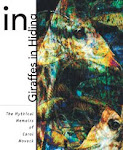An allegedly brilliant new young poet published by a prestigious press, whose first book has received a rave review by an important so and so. Wow! Aren't you falling all over your feet to get the book? Now read a critic's astute analysis of it. What's lauded shouldn't be automatically applauded. A lesson for the gullible, unquestioning reader.
CPR - Pretty Pieces by Joan Houlihan
"Why speak? A good question. But this debut collection provokes more specific questions: In what way are these poems not short, short, stories? What governs their line breaks? Where is the power of trope, concision, sound, rhythm, the one right image that radiates from an emotional center? What drives these poems other than the descriptive, sometimes merely competent, writing of literary fiction?
Why Speak? centers on the narrator’s childhood memories and family dramas, and the collection as a whole has a memoir-ish feel, one we associate with the “I” and all its historical assemblages and dissemblings. But there are “I”s and there are “I’s”—why should we care about this one? As an editor once observed to a poet awaiting word on his submission: “No one wants to read about you, they want to read about themselves.” The “I” of the poem must perforce be a universal one in order to reach the “I” of the reader and not be merely a recitation of personal history overheard without involvement, like listening to a stranger on a bus—half-dozing, snapping awake at points where the story seems to gain momentum, then dozing off again when it turns out again to go nowhere: ..................."
"Why speak? A good question. But this debut collection provokes more specific questions: In what way are these poems not short, short, stories? What governs their line breaks? Where is the power of trope, concision, sound, rhythm, the one right image that radiates from an emotional center? What drives these poems other than the descriptive, sometimes merely competent, writing of literary fiction?
Why Speak? centers on the narrator’s childhood memories and family dramas, and the collection as a whole has a memoir-ish feel, one we associate with the “I” and all its historical assemblages and dissemblings. But there are “I”s and there are “I’s”—why should we care about this one? As an editor once observed to a poet awaiting word on his submission: “No one wants to read about you, they want to read about themselves.” The “I” of the poem must perforce be a universal one in order to reach the “I” of the reader and not be merely a recitation of personal history overheard without involvement, like listening to a stranger on a bus—half-dozing, snapping awake at points where the story seems to gain momentum, then dozing off again when it turns out again to go nowhere: ..................."












No comments:
Post a Comment